11 Best AI SEO Search Engines To Use

Are you looking for the Best AI Search Engines to use for your business or for searching anything on the web? The digital search landscape is undergoing a significant transformation, driven by the advent of Artificial Intelligence (AI). While traditional search engines remain foundational, AI-powered search engines represent the next frontier in information discovery and analysis.
These advanced tools move beyond simple link indexing. They utilize sophisticated AI models to comprehend user intent, synthesize information from diverse sources, provide direct, contextual answers, generate content, analyze complex data, and assist with specialized tasks.
For small and medium-sized enterprises (SMEs), AI search engines offer unprecedented opportunities to improve operational efficiency, gain deeper market insights, accelerate research and development, refine content strategies, and maintain a competitive edge. Understanding the capabilities and appropriate applications of these tools is becoming increasingly vital.
We have compiled 11 of the leading AI search engines relevant today. This will help you understand the unique characteristics of each search engine (or browser), see optimal use cases, and operational considerations for each platform, enabling you to identify the most suitable tools for your organization’s objectives.
Perplexity AI – The Research Specialist
- What it is: Perplexity positions itself as a “conversational answer engine.” It excels at providing direct, accurate answers backed by clear source citations. Think of it as a research assistant that shows its work.
- Pricing: Free (offers 5 “Pro” searches daily) | Pro: $20/month (300+ Pro searches, access to advanced models like Claude 3.7 Sonnet).
- Best for: Content teams, marketers needing sourced data, academic research, anyone needing verifiable information quickly.
- USP (Unique Selling Proposition): Strong emphasis on citing sources directly within the answer. Its “Pro Search” feature performs deeper analysis for complex queries.
- Why Choose It? If you need trustworthy answers for blog posts, reports, or presentations and want to easily verify the information, Perplexity is fantastic. It saves time fact-checking.
- How to Use Efficiently: Use the “Focus” feature to tailor searches (e.g., Academic, Writing, WolframAlpha for computational data). Ask specific, detailed questions. Use Pro Search for in-depth market analysis or competitive intelligence.
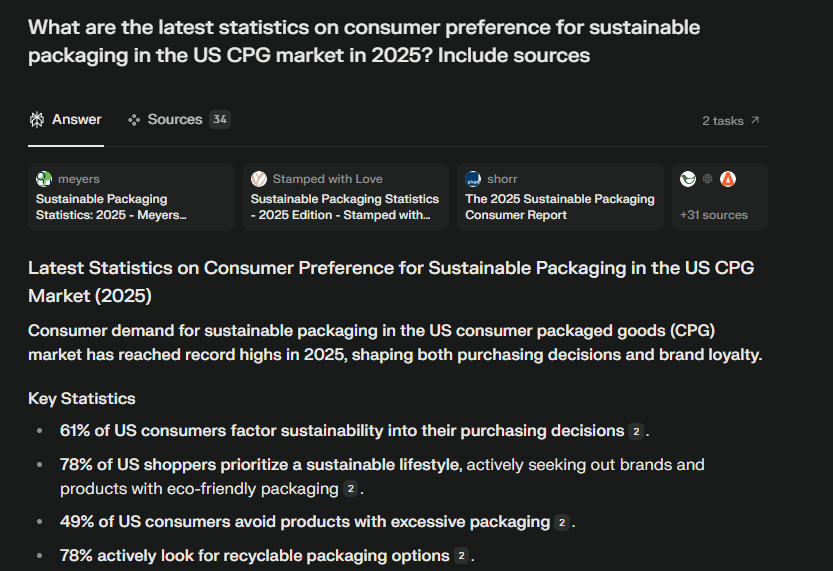
Scenario: A marketing manager needs statistics on sustainable packaging trends for a new product launch presentation. Query: “What are the latest statistics on consumer preference for sustainable packaging in the US CPG market in 2025? Include sources.”
You.com – The Privacy-First Option
- What it is: You.com blends traditional search results with AI chat capabilities, offering different modes (“Smart,” “Genius,” “Research,” “Create”) while strongly emphasizing user privacy.
- Pricing: Free | YouPro: $15/month (access to advanced AI models like GPT-4o, Claude 3.7 Sonnet, stable diffusion for images).
- Best for: Businesses in sensitive industries (healthcare, legal, finance), users concerned about data tracking, general search with an AI boost.
- USP: Claims zero data tracking for personalized ads in its standard modes and offers customization of sources.
- Why Choose It? If data privacy is a major concern for your business or clients, You.com offers a compelling alternative without sacrificing AI features.
- How to Use Efficiently: Select the appropriate mode for your task. Use “Genius” or “Research” for deep dives. Customize preferred sources in settings to tailor results to your industry.

Scenario: A healthcare clinic owner wants to research HIPAA-compliant marketing software without their searches being tracked for advertising. Query (in Genius mode): “List and compare HIPAA-compliant email marketing tools suitable for small US clinics, focusing on features and estimated costs.”
DeepSeek – The Document Analyst & Reasoning Engine
- What it is: Developed by a research group, DeepSeek offers powerful AI models (including the recent V3) known for strong reasoning and coding abilities. It also features a very large context window, making it great for analyzing long documents. Recent benchmarks show it performing very well.
- Pricing: Currently Free (access via web interface or API, some models might have usage costs via API in the future).
- Best for: Analyzing long reports, contract reviews, technical documentation, market research requiring deep reasoning, coding tasks.
- USP: Excellent reasoning capabilities and a large context window (reportedly up to 128K tokens, though specific interfaces might vary) allow it to understand and summarize lengthy texts effectively. Often open-source focused.
- Why Choose It? When you need an AI to process and extract insights from dense documents or tackle problems requiring logical steps, DeepSeek is a top contender, especially given its current free access.
- How to Use Efficiently: Upload documents directly for analysis. Structure prompts to leverage its reasoning skills (e.g., “Analyze this market report for threats and opportunities for a small SaaS company in the fintech space”). Use it for code generation or debugging complex issues.

Scenario: A small business owner needs to quickly understand the key implications of a 50-page industry trend report. Action: Upload the PDF report and ask: “Summarize the key findings, opportunities, and risks outlined in this report for a business offering [your service/product] in the US market.”
Bing AI (Microsoft Copilot) – The Real-Time Expert
- What it is: Integrated into Bing search, Microsoft Edge, Windows, and Microsoft 365, Copilot leverages powerful models like GPT-4o and DALL-E 3, combined with real-time web access via Bing search.
- Pricing: Free (requires Microsoft account, usage limits may apply) | Copilot Pro: $20/month (priority access, faster performance, enhanced AI capabilities in M365 apps).
- Best for: Getting up-to-the-minute information, tracking trends, users heavily invested in the Microsoft ecosystem, generating images, general research with sources.
- USP: Deep integration with Microsoft products and real-time web access powered by Bing search, combined with advanced AI models. Offers different conversational styles (Creative, Balanced, Precise).
- Why Choose It? If your business runs on Microsoft 365, Copilot offers seamless integration. Its real-time web access is excellent for current events and market trends.
- How to Use Efficiently: Choose the conversation style that fits your need (Precise for facts, Creative for brainstorming). Leverage its integration within Edge or M365 apps for contextual help. Use it for summarizing web pages or documents directly in the Edge browser.

Scenario: A social media manager wants to understand the current online conversation about a competitor’s recent product launch. Query (Balanced style): “What is the current consumer sentiment online regarding [Competitor Brand]’s new [Product Name] launched last week? Summarize key discussion points and cite sources.”
Google Gemini – The All-Rounder
- What it is: Google’s powerful AI model, accessible via its own web interface, integrated into Google Search (as AI Overviews), and across Google Workspace (formerly G Suite).
- Pricing: Free (uses Gemini 1.5 Flash/Pro) | Gemini Advanced: $20/month (uses the most capable model, Gemini 1.5 Pro, integrates deeper into Workspace apps like Docs, Sheets, Gmail).
- Best for: General business queries, users deep in the Google ecosystem (Gmail, Docs, Sheets), leveraging Google Search data, multimodal tasks (analyzing images, processing text and code).
- USP: Deep integration with Google’s vast data sources and ecosystem. Strong multimodal capabilities and access to Google’s latest AI advancements.
- Why Choose It? If your business relies heavily on Google Workspace and you value integration with Search, Gemini is a natural fit. Gemini Advanced offers powerful capabilities directly within your workflow.
- How to Use Efficiently: Use extensions to connect Gemini to your Google Workspace apps (Advanced). Upload images or data for analysis. Ask comparative questions leveraging Google’s index. Use it within Gmail or Docs (Advanced) to draft emails, summarize documents, or generate content.
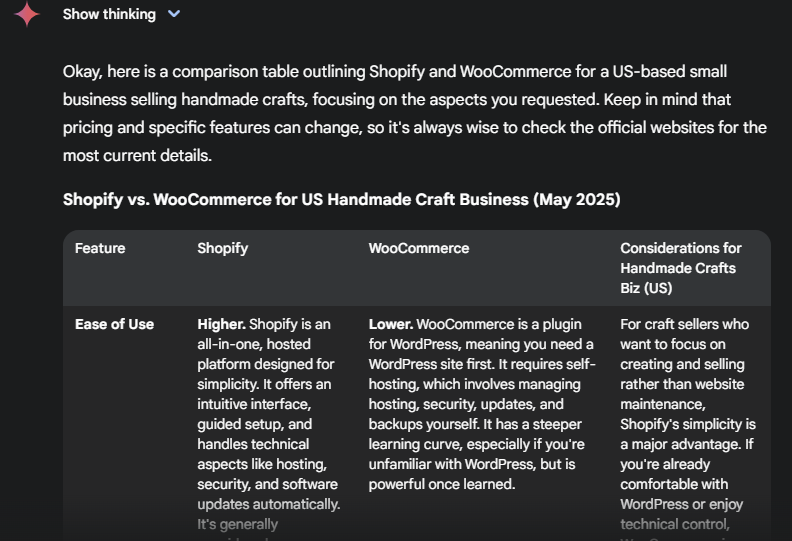
Scenario: An e-commerce manager wants to compare two popular platforms for their small business. Query: “Create a table comparing Shopify and WooCommerce for a US-based small business selling handmade crafts, focusing on ease of use, pricing, customization, and SEO features.”
Phind – The Developer’s Choice
- What it is: An AI search engine specifically tailored for developers and technical questions. It provides code examples, explanations, and debugging help, often citing sources like Stack Overflow and documentation.
- Pricing: Free | Pro: $10/month (access to better models, higher usage limits).
- Best for: Software developers, tech startups, IT support, SaaS companies, anyone needing technical answers or code generation/debugging.
- USP: Focuses specifically on technical queries, providing relevant code snippets and explanations quickly.
- Why Choose It? If your business involves software development or requires frequent technical troubleshooting, Phind can save significant time compared to general search engines or even general AI chatbots.
- How to Use Efficiently: Ask specific coding questions, provide error messages for debugging help, specify programming languages or frameworks. Use it to understand complex technical concepts.
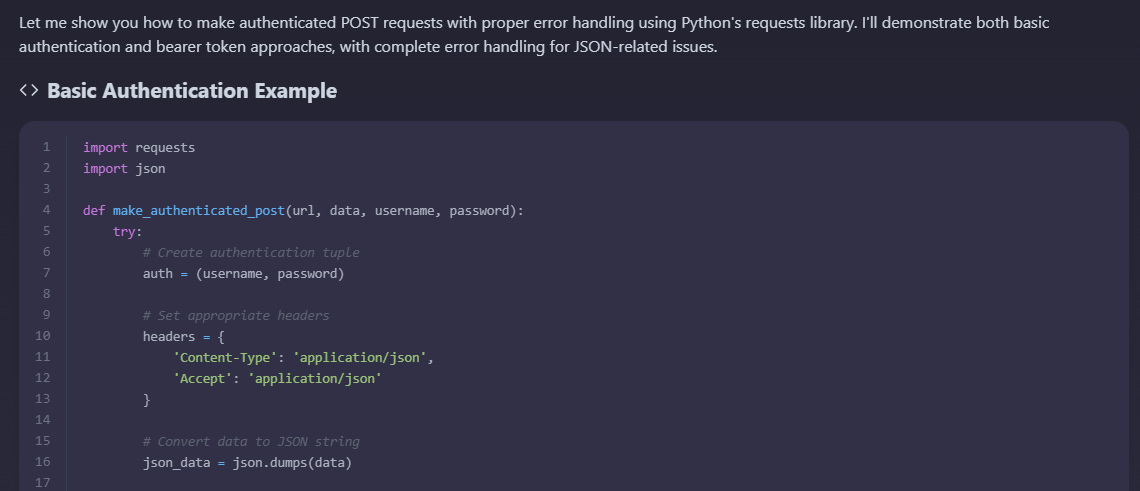
Scenario: A developer at a small tech company is stuck on an API integration issue. Query: “Show me how to make a POST request with authentication headers using Python’s ‘requests’ library to the [API Endpoint Type] API, handling potential JSON errors.”
Andi– The Ad-Free Experience
- What it is: Andi presents itself as a “smart search assistant” that provides direct answers and summaries in a clean, conversational, and ad-free interface. It aims to give you information, not just links.
- Pricing: Currently Free.
- Best for: Users looking for quick, straightforward answers without ads or sponsored clutter. Good for quick explanations of concepts.
- USP: Ad-free search experience with a focus on direct answers synthesized from sources. Conversational interface.
- Why Choose It? If you find traditional search results cluttered with ads and prefer a cleaner, more direct answer format for simple queries, Andi is worth trying.
- How to Use Efficiently: Ask clear, direct questions. Use it for quick definitions, summaries, or explanations of regulations or concepts where you want a concise overview.
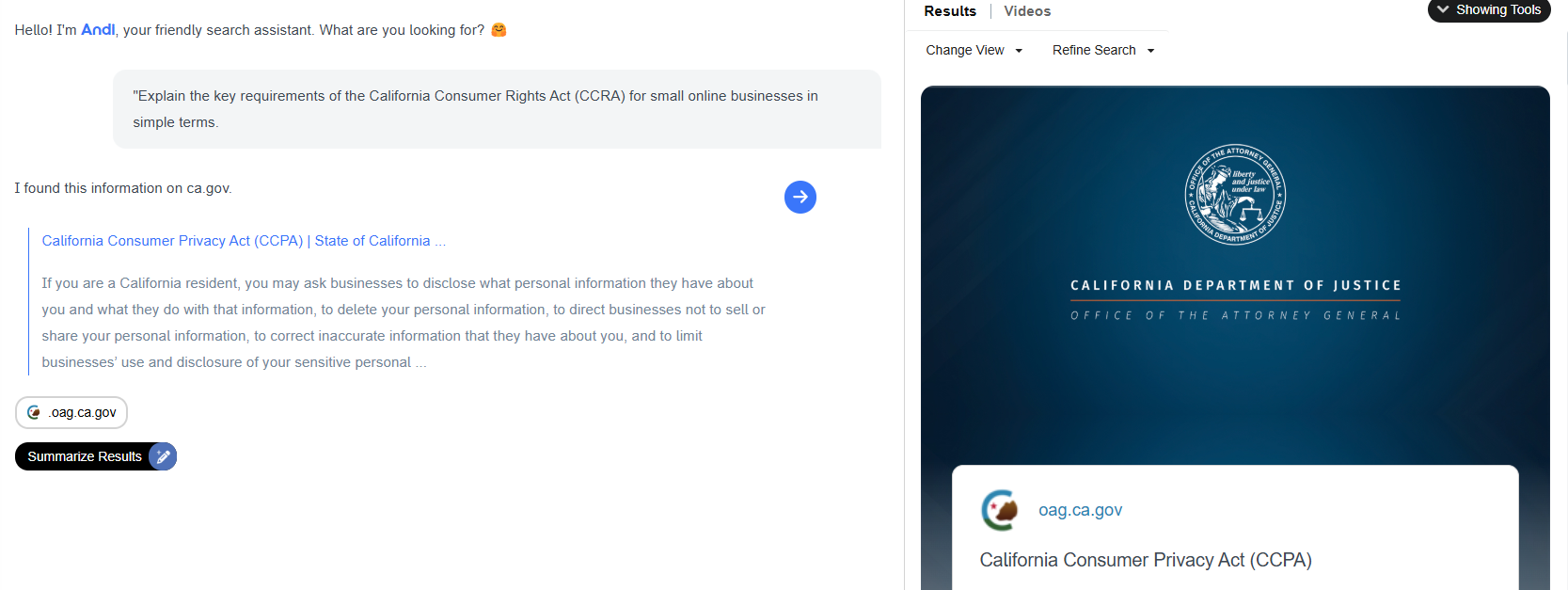
Scenario: A small business owner needs a quick, simple explanation of a new state regulation. Query: “Explain the key requirements of the California Consumer Rights Act (CCRA) for small online businesses in simple terms.”
Kagi – The Premium Search
- What it is: Kagi is a premium, subscription-based search engine focused on user experience, speed, accuracy, and customization, with absolutely no ads or tracking.
- Pricing: Starts at $10/month (usage-based tiers available). Offers a trial.
- Best for: Users who value privacy, speed, and control over their search results, and are willing to pay for a premium, ad-free experience. Executives, researchers, power users.
- USP: Completely ad-free and tracker-free, highly customizable results (ranking preferences, blocking sites), uses multiple indexes plus its own AI summarization features (“Quick Answer”).
- Why Choose It? If you’re frustrated by ads, biased results, and lack of control in traditional search, and value a high-quality, customizable experience, Kagi’s subscription might be worth it.
- How to Use Efficiently: Utilize “Lenses” to create focused search scopes (e.g., only search academic papers or specific forums). Personalize domain rankings to boost trusted sources and downrank low-quality ones. Use the “Summarize Page” feature.
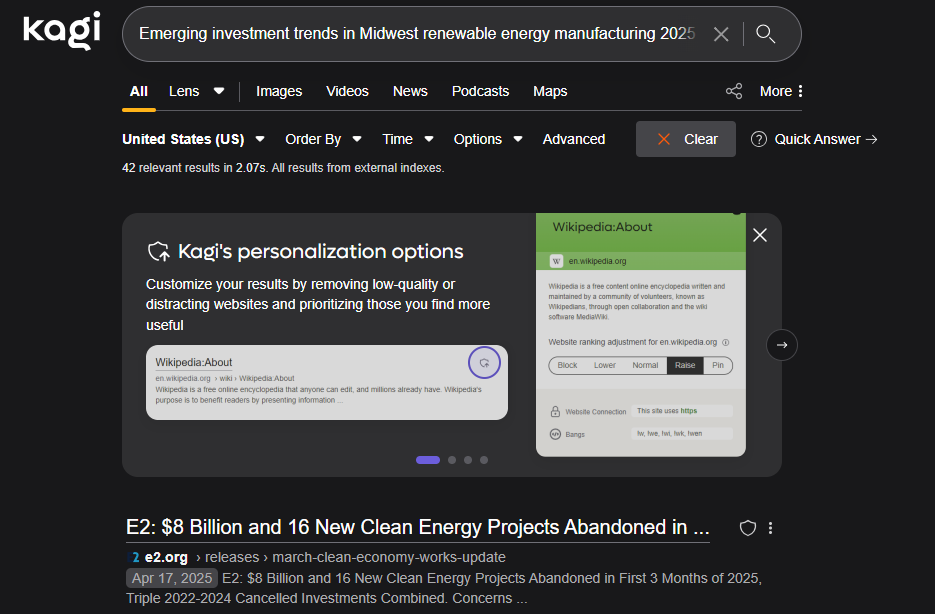
Scenario: A business strategist needs to research emerging trends in a niche industry, filtering out low-quality blogs and focusing on reputable financial news sites and research papers. Action: Configure Kagi Lenses and domain preferences to prioritize specific high-quality sources for the query: “Emerging investment trends in Midwest renewable energy manufacturing 2025”
Exa (formerly Metaphor) – The Link Master
- What it is: Exa approaches search differently. You provide it with example links or descriptive “prompts” about the type of content you’re looking for, and it finds similar, high-quality pages across the web.
- Pricing: Free (with usage limits) | Pro plans available (e.g., around $15/month, check site for current pricing).
- Best for: SEO professionals doing backlink research, marketers looking for specific types of content examples (e.g., high-performing landing pages), discovering niche communities or resources.
- USP: Searches based on the content of links rather than just keywords, enabling discovery of similar pages and high-quality sources.
- Why Choose It? When keyword search isn’t finding the specific type of site or content structure you need (e.g., finding guest post opportunities on specific types of blogs), Exa’s link-based approach can uncover hidden gems.
- How to Use Efficiently: Provide it with a URL of a site you like and ask it to find similar ones. Describe the kind of page you want (e.g., “Find articles arguing against [topic] on authoritative .edu domains”).

Scenario: An SEO specialist wants to find potential backlink opportunities from university websites related to sustainable business practices. Query Prompt: “Find blog posts or resource pages about sustainable business hosted on .edu domains similar to [link to a known good example].”
Komo – The Trend Spotter
- What it is: Komo AI focuses on searching within online communities and social platforms to find real-time conversations, trends, and recommendations.
- Pricing: Currently Free.
- Best for: Social media managers, marketers researching community sentiment, product managers looking for user feedback, finding trending topics.
- USP: Specializes in searching social platforms and communities (like Reddit, TikTok) to surface current trends and discussions.
- Why Choose It? If you need to tap into the zeitgeist, understand what specific communities are talking about right now, or find trending content ideas, Komo is designed for that.
- How to Use Efficiently: Use it to explore topics within specific communities. Ask questions about current trends or opinions on social platforms. Search for product recommendations or discussions.

Scenario: A marketing team wants to create TikTok content relevant to Gen Z consumers in the US. Query: “What are the emerging TikTok video trends and challenges popular among US Gen Z users this week?”
Brave Leo – The Privacy Alternative (Browser Integrated)
- What it is: Leo is the AI assistant built directly into the privacy-focused Brave browser. It can summarize webpages, answer questions, and generate content, leveraging various LLMs (including self-hosted ones for enhanced privacy).
- Pricing: Free (uses models like Mixtral, Claude Haiku) | Leo Premium: $15/month (access to larger models like Claude Sonnet, higher rate limits).
- Best for: Users of the Brave browser, security-conscious individuals, quick summaries of web content, general AI assistance without leaving the browser.
- USP: Integrated directly into a privacy-first browser, offers choices of LLMs, uses privacy-preserving techniques like reverse proxies, some models hosted by Brave.
- Why Choose It? If you already use and trust the Brave browser for its privacy features, Leo provides convenient AI capabilities without needing a separate tool, while maintaining a strong privacy stance.
- How to Use Efficiently: Use the sidebar icon in Brave to ask Leo questions about the page you’re currently viewing (summarize, find key points). Use it for quick content generation or answering questions without opening a new tab. Select different models based on your needs (speed vs. capability).
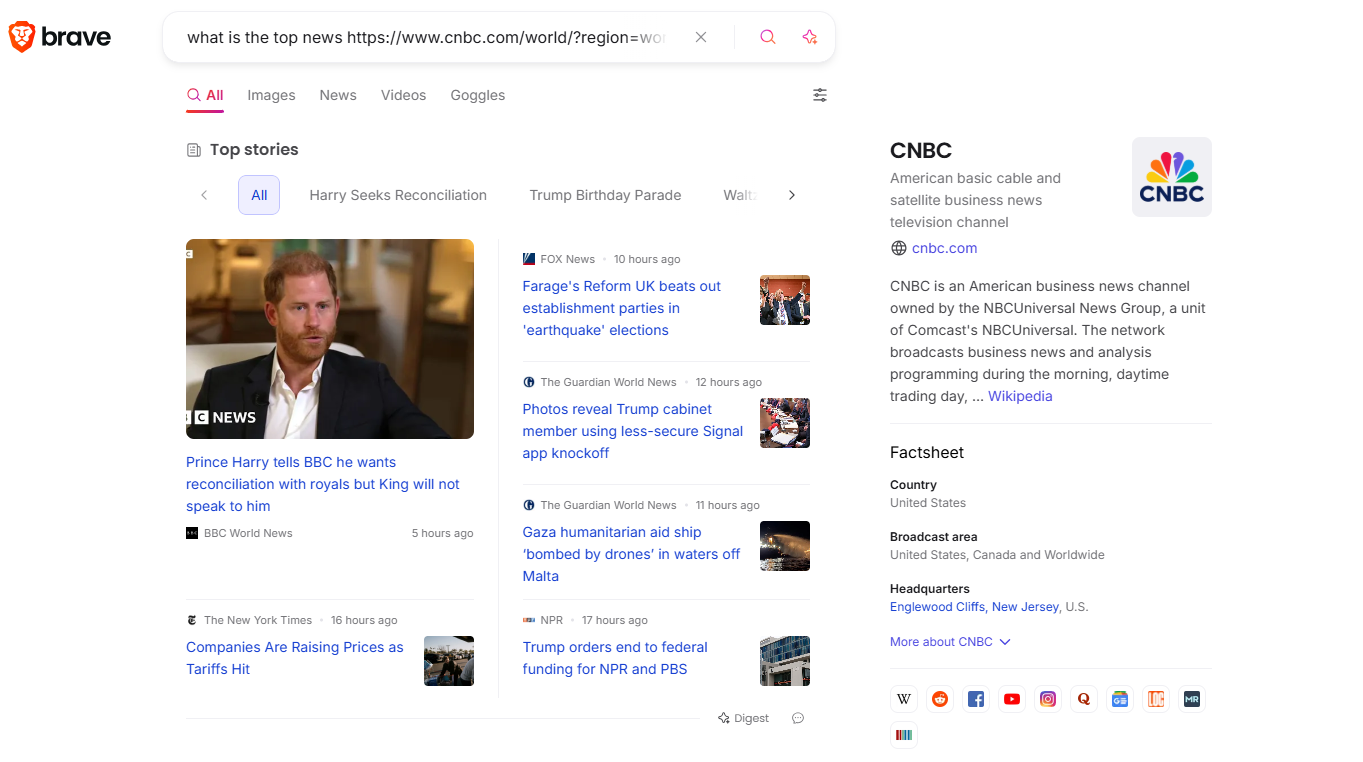
Scenario: A financial advisor using the Brave browser needs a quick summary of a long financial news article before discussing it with a client. Action: Click the Leo icon in the browser sidebar and ask: “Summarize the key takeaways from this article regarding [specific topic].”
Looking for Web Browsers instead of Search Engines? We covered a comprehensive comparison for your convenience.
AI Search Engine Pros and Cons
| AI Search Engine | Pros | Cons |
| Perplexity AI | Excellent source citation, clear answers, good for research accuracy, multiple focus modes. | Free tier limits “Pro” searches, can be less conversational than others. |
| You.com | Strong privacy focus, customizable sources, multiple AI models (Pro), blend of chat/links. | The free version uses less advanced AI, multiple modes might confuse initially. |
| DeepSeek | Strong reasoning/coding, excellent for long documents, high benchmark performance, currently free. | The newer interface may be less polished, primarily focused on model capability. |
| Bing Copilot | Real-time info, Microsoft ecosystem integration, powerful models (GPT-4o, DALL-E 3), sources cited. | Requires Microsoft account, free use deprioritized at peak times, relies on Bing index. |
| Google Gemini | Google ecosystem integration, leverages Search data, strong multimodal, advanced paid features. | AI Overviews still evolving, free version less powerful than some paid tiers, source transparency varies. |
| Phind | Excellent for coding/technical queries, provides code examples, fast for dev tasks, affordable Pro. | Highly specialized, not ideal for general non-technical research. |
| Andi | Ad-free, clean interface, direct answers, conversational style, free to use. | May lack depth for complex research, relatively new compared to established engines. |
| Kagi | Ad-free, no tracking, highly customizable, fast, AI summarization, high-quality focus. | Subscription cost (no free tier beyond trial), requires setup effort for customization. |
| Exa | Unique link-based search, great for niche discovery/backlinks, surfaces high-quality results. | Different search paradigms take getting used to, not intuitive for simple queries, free tier limits. |
| Komo | Tracks social/community trends, surfaces real-time discussions, useful for audience research, free. | Focused on social data, less suitable for academic/technical research, relies on indexed platforms. |
| Brave Leo | Brave browser integration, strong privacy focus, choice of AI models, summarizes web content well. | Requires Brave browser, premium features need subscription, capabilities depend on selected LLM. |
Comparison Table: AI Search Engines at a Glance
| Tool | Price (Free/Paid) | Best For | Business Use Case | Key Pro |
| Perplexity AI | Free / $20/mo | Research, Cited Answers | White papers, market research | Strong source citation |
| You.com | Free / $15/mo | Privacy-Conscious Users | Sensitive industry research (Health) | Privacy focus, customization |
| DeepSeek | Free | Document Analysis, Reasoning | Long report analysis, contract review | Powerful reasoning, large context |
| Bing Copilot | Free / $20/mo | Real-time Info, Microsoft Users | Trend tracking, M365 integration | Real-time web access |
| Google Gemini | Free / $20/mo | General Use, Google Ecosystem | Comparative analysis, Workspace tasks | Deep Google integration |
| Phind | Free / $10/mo | Developers, Technical Queries | SaaS troubleshooting, coding help | Developer-focused answers |
| Andi | Free | Quick, Ad-Free Answers | Simple explainers, concept summaries | Clean, ad-free interface |
| Kagi | $10+/mo | Premium, Customizable Search | Deep competitive intelligence | High customization, ad-free |
| Exa | Free / ~$15/mo | Link-Based Discovery, SEO | Backlink strategy, niche finding | Finds similar content/sites |
| Komo | Free | Social Trend Spotting | Social media content ideation | Community trend tracking |
| Brave Leo | Free / $15/mo | Privacy (Browser Integrated) | Secure Browse assistance | Browser integration, privacy |
(Note: Pricing and specific features are subject to change. Please verify on the respective websites.)
Choosing the Right AI Search Engine for Your Business
There is no single “best” AI search engine; the optimal choice is contingent upon your organization’s specific requirements, budget, and existing workflows.
- For deep, verifiable research: Perplexity AI offers significant advantages.
- If privacy is a primary concern: You.com or Brave Leo warrant consideration.
- For deep integration with Microsoft/Google ecosystems: Utilize Copilot or Gemini, respectively.
- For technical queries and development support: Phind is purpose-built.
- For analyzing extensive documents: DeepSeek demonstrates strong capabilities.
- To monitor social media trends: Komo provides specialized functionality.
- For a premium, ad-free, and customizable experience: Kagi caters to discerning users.
We recommend experimenting with the free tiers or trials of several platforms to determine which best align with your operational style and information needs.
Feeling Overwhelmed? Let Boostability Handle Your Search Visibility!
Exploring these AI tools can unlock new efficiencies, but mastering search engine visibility requires more than advanced research capabilities. Achieving prominent online positioning for your business necessitates strategic, ongoing Search Engine Optimization (SEO).
This is Boostability’s area of expertise.
As global leaders in affordable SEO solutions tailored for small and medium-sized businesses, we understand that while AI assists in research, sustainable growth comes from proven SEO methodologies executed by experienced professionals. Our team focuses on the core strategies that demonstrably improve search rankings and drive qualified customer traffic:
- Expert Keyword Research: Identifying high-intent search terms used by your target audience.
- Comprehensive On-Site Optimization: Ensuring your website meets technical and content standards for search engines.
- High-Quality Content Creation: Developing valuable content that engages users and builds authority.
- Targeted Local SEO: Maximizing visibility within your geographic service areas.
- Authoritative Link Building: Establishing credibility and trust signals through quality backlinks.
- Transparent Performance Reporting: Providing clear insights into campaign progress via our LaunchPad platform.
Do not let the complexities of SEO or the dynamic digital environment impede your growth. Partner with Boostability to navigate the path to enhanced online visibility.
Ready to elevate your online presence and increase customer acquisition?
➡️ Request Your Complimentary SEO Consultation Today!
➡️ Review Our Affordable SEO Service Packages
➡️ Examine Our Small Business SEO Success Stories
We encourage continued exploration of these evolving technologies and welcome discussion on their effective application in business.
Original content written last June 26, 2023, updated on May 15, 2025

